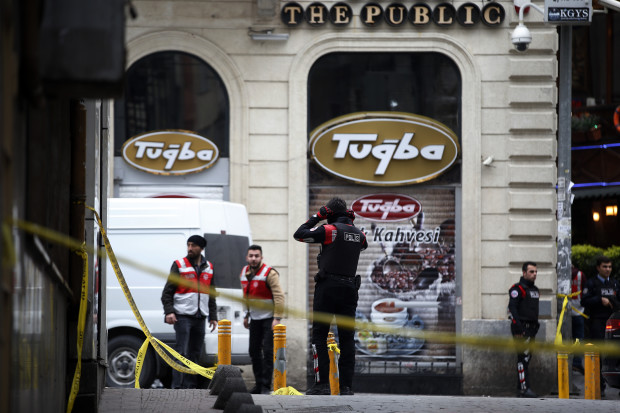
Security officials seen at the site after an explosion on a street, in Istanbul, Turkey, Saturday, March 19, 2016. An explosion on Istanbuls main pedestrian shopping street on Saturday has killed a number of people and injured over a dozen others. AP
ISTANBUL, Turkey — A suicide blast ripped through a major shopping district in Istanbul on Saturday, killing at least four people less than a week after another deadly attack left 35 dead in Ankara.
The sixth major bombing in Turkey since July targeted Istiklal Caddesi, a bustling two-kilometer-long pedestrian street usually thronged with shoppers, tourists and buskers but which was still relatively quiet when the bomber struck on Saturday morning.
READ: Car bomb in Turkey’s capital kills at least 37, wounds 125 | Kurdish militants claim Ankara bombing, warn foreign tourists
Turkish media said three Israelis and one Iranian were killed, while Washington said two US citizens were among the dead. It was not immediately clear if the two American victims had dual nationality or were additional fatalities.
Prime Minister Ahmet Davutoglu vowed that the investigation would identify those responsible while the US condemned a “vicious attack”.
“We will fight with determination and perseverance until all forms of terrorism are eradicated,” Davutoglu said.
Deputy health minister Ahmet Baha Otuken named an Israeli man, Simha Demri, as being among the victims of the attack, in which 36 people were injured.
The CNN-Turk channel said two other Israelis — Yonathan Suher, 40 and Avraham Goldman, 70 — were killed along with Demri, 60, and Iranian, Ali Rıza Khalman, 31.
No group has yet claimed responsibility for the explosion but pro-government media blamed it on the Islamic State of Iraq and Syria (ISIS) group, which has been accused of several attacks in Turkey in recent months, including a suicide bombing near the Blue Mosque in January, in which 12 German tourists were killed.
Several media outlets named the alleged perpetrator of Saturday’s attack as Savas Yildiz, a 33-year-old Turkish radical.
ISIS was also blamed for an attack that left 103 people dead at a pro-Kurdish peace rally in Ankara in October.
More recently, Kurdish rebels embroiled in a resurgent conflict with the state have also staged suicide attacks, striking Ankara twice over the past month, killing dozens of people.
Of the 36 injured, Health Minister Mehmet Muezzinoglu said 12 were foreigners. Six were Israelis, two were Irish and the four others from Germany, Iceland, Iran and Dubai, his office said.
CCTV footage circulated by Turkish media showed a man wearing a long coat presented as the bomber approaching a small group of people outside a local government building directly before the blast.
Sahin said the government building appeared to be the intended target.
A Western diplomatic source said the attacker may also have had tourists in his sights.
‘Carnage’
A waiter working in a nearby restaurant told AFP he heard “a loud explosion”.
“When I came out, people were running in every direction, but I ran towards the blast site to see what happened,” said the waiter who gave just his first name Mustafa.
He described scenes of “carnage” with “people lying all about”.
Deputy prime minister Numan Kurtulmus told reporters he expected “unqualified support from those who call themselves Turkey’s friends” — apparently referencing recent criticism in Europe of hardline President Recep Tayyip Erdogan.
A US State Department spokesman condemned the attack.
“The United States stands in solidarity with our NATO ally Turkey in combating the common threat of terrorism,” spokesman John Kirby said.
United Nations chief Ban Ki-moon called for the perpetrators of “this appalling violence” to be brought to justice, while a European Union spokesperson sent a message of “continuing solidarity and support to Turkey”.
Heightened alert
Turks are reeling from the increased frequency of the terror attacks that risk dealing a knockout blow to the country’s vital tourism trade.
The radical Kurdistan Freedom Falcons (TAK) claimed responsibility for last weekend’s attack on a busy transport hub in Ankara that killed 35 people.
TAK, which also claimed a February suicide bombing targeting troops in Ankara that killed 29 people, has ties to the outlawed Kurdistan Workers’ Party (PKK) against which the Turkish army is engaged in a major offensive.
ISIS was blamed for three of the previous five attacks, including an attack on a peace rally in Ankara in October that claimed 103 lives.
On Thursday, Germany had closed its embassy in Ankara and consulate in Istanbul, citing “very serious” indications of planned attacks.
The US embassy in Ankara had also warned its citizens in Turkey to avoid public gatherings ahead of Kurdish Nevruz (New Year) celebrations on Sunday and Monday, a rallying point in the past for pro-Kurdish protests.
Embarrassed by accusations of security lapses, Erdogan has lashed out at journalists, activists and intellectuals who criticise his renewed battle with the PKK and the suffering it has brought to parts of southeast Turkey, calling them “accomplices” of terror.
In July, the PKK resumed its three-decade-long insurgency against the Turkish state following the collapse of a shaky two-year ceasefire.
The conflict has claimed some 40,000 lives.